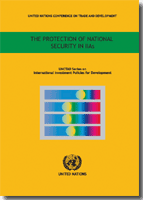Yellow Series: The Protection of National Security in IIAs
After almost two decades of nearly unequivocal support for investment liberalization, many countries have started to re-evaluate these policies, and some have introduced adjustments, thereby exercising their right to regulate foreign investment to pursue domestic policy objectives. One of the main areas where a more restrictive approach towards foreign investment has become manifest relates to national security, and to the protection of strategic industries and critical infrastructure. While national security concerns in relation to foreign investment are nothing new and must be an issue even for the most liberal country, cases have become more frequent in recent years where foreign investors have been rejected for national security reasons or subjected to other restrictive measures after establishment. Most often, security concerns have been invoked in relation to planned investments in so-called strategic industries and critical infrastructure. Thus, the issue has implications that go far beyond the defence-related activities for which the national security exception was initially designed.
This leads to the issue of the role of international investment agreements (IIAs) in connection with investment restrictions based on national security considerations. By establishing obligations on Contracting Parties concerning the treatment of foreign investors, IIAs impose certain limits on the sovereign right of each country to regulate foreign investment in its territory, including its regulations in the area of national security. There is, therefore, a potential conflict between the objectives of investment protection on the one hand, and addressing the Contracting Parties´ security concerns on the other. However, numerous IIAs expressly dispense Contracting Parties from all or parts of their treaty obligations in cases where an investment poses a threat to national security. Thus, the challenge for Governments is to find an appropriate balance - ensuring a sufficient level of protection for its national security interests, while at the same time ensuring that investment protection is still strong enough to keep the country attractive for foreign investors.
The review undertaken for this study suggests that up to now, only a minority of IIAs contain some kind of national security exception, and that such clauses are more frequent in agreements covering the entry of foreign investment than in treaties limited to the post-establishment phase. This can be explained by the fact that national security concerns in connection with foreign investment primarily arise with regard to the admission issue.
In light of recent developments, IIA negotiators may wish to pay more attention to the possible coverage of strategic industries and economic crisis in national security exceptions and related concepts. They have to ask themselves whether they see a need for a broad and undefined security exception that gives them maximum discretion, or whether they prefer a more limited clause in the interests of better legal security and predictability. In the latter case, IIA Contracting Parties have various options to clarify the scope and conditions under which a national security exception applies. Among them is to give more precision to the term "national security" and the situations in which the exception clause should apply. Also, one could consider additional preconditions for invoking the exception, such as an explicit good faith requirement concerning the use of the clause, and a periodic review of the continuous need to uphold the security-related investment restriction. All these options help to prevent the subject of national security exceptions in IIAs from becoming a "black and white" matter, and allow more differentiated solutions to be adopted, permitting a fair balance between the interests of the Contracting Parties and the foreign investors.
















